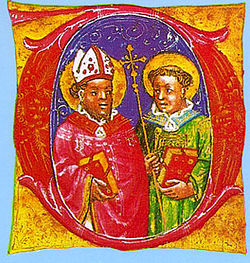Hermagoras of Aquileia
| Saint Hermagoras of Aquileia | |
|---|---|

Hermagoras and Fortunatus
|
|
| Died | traditionally ~70, but probably 3rd or 4th century Aquileia or Singidunum (Belgrade) |
| Venerated in | Roman Catholic Church, Eastern Orthodox Church |
| Feast | July 12 |
| Attributes | depicted as bishop. |
| Patronage | Aquileia, Udine |
Saint Hermagoras of Aquileia (also spelled Hermenagoras, Hermogenes, Ermacoras) (Italian: Sant'Ermagora, Slovene: sveti Mohor; fl. 3rd century – c. 305) is considered the first bishop of Aquileia, northern Italy. Christian tradition states that he was chosen by Saint Mark to serve as the leader of the nascent Christian community in Aquileia, and that he was consecrated bishop by Saint Peter. Hermagoras and his deacon Fortunatus (Slovene: sveti Fortunat) evangelized the area but were eventually arrested by Sebastius, a representative of Nero. They were tortured and beheaded.
"Hermagoras" was listed as the name of the first bishop of Aquileia. He was probably a bishop or lector living in the second half of the 3rd century or at the beginning of the fourth. However, because the name or origins of the very first bishop was unknown, Aquileian traditions arising in the 8th century made Hermagoras a bishop of the apostolic age, who had been consecrated by Saint Peter himself. As Hippolyte Delehaye writes, "To have lived among the Savoir's immediate following was...honorable...and accordingly old patrons of churches were identified with certain persons in the gospels or who were supposed to have had some part of Christ's life on earth." Thus, false apostolic origins were ascribed to Hermagoras and the church at Aquileia. The tradition that Fortunatus was Hermagoras' deacon is also probably apocryphal, but a Christian named Fortunatus may have been a separate martyr at Aquileia.
Hermagoras and Fortunatus may have been martyrs killed in Singidunum (today's Belgrade). There, around 304 during the religious persecutions led by Emperor Diocletian, Hermagoras, or Hermogenes, was a lector and Fortunatus a deacon. Their relics may have been brought to Aquileia a century later, and that city became the center of their cult as it was at Aquileia that the belief in their apostolic origin arose. Aquileia was one of the first cities in which Christianity could be practised unhindered; the Patriarch of Aquileia was the second most important person of the Western Church after the bishop of Rome.
...
Wikipedia
